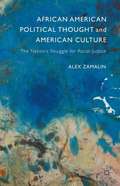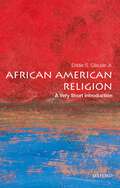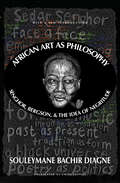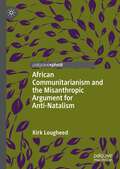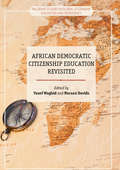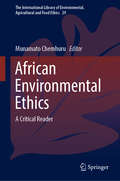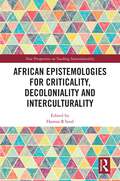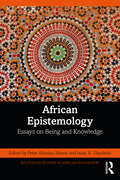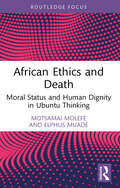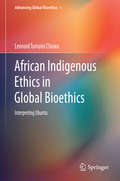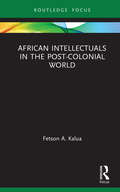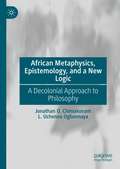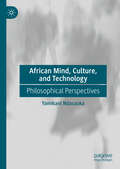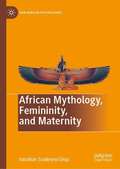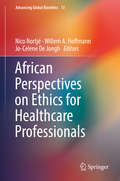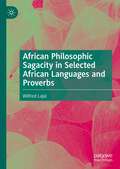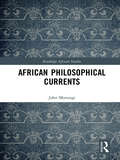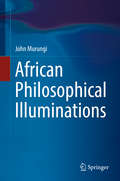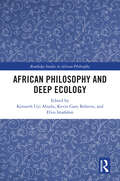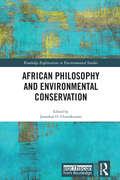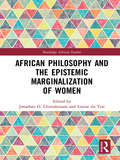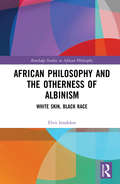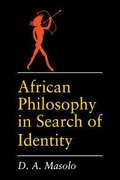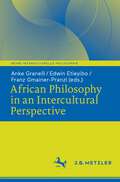- Table View
- List View
African American Political Thought and American Culture: The Nation's Struggle For Racial Justice
by Alex ZamalinThis book demonstrates how certain African American writers radically re-envisioned core American ideals in order to make them serviceable for racial justice. Each writer's unprecedented reconstruction of key American values has the potential to energize American citizenship today.
African American Religion: A Very Short Introduction
by Eddie S. Glaude Jr.Since the first African American denomination was established in Philadelphia in 1818, churches have gone beyond their role as spiritual guides in African American communities and have served as civic institutions, spaces for education, and sites for the cultivation of individuality and identities in the face of limited or non-existent freedom. In this Very Short Introduction, Eddie S. Glaude Jr. explores the history and circumstances of African American religion through three examples: conjure, African American Christianity, and African American Islam. He argues that the phrase "African American religion" is meaningful only insofar as it describes how through religion, African Americans have responded to oppressive conditions including slavery, Jim Crow apartheid, and the pervasive and institutionalized discrimination that exists today. This bold claim frames his interpretation of the historical record of the wide diversity of religious experiences in the African American community. He rejects the common tendency to racialize African American religious experiences as an inherent proclivity towards religiousness and instead focuses on how religious communities and experiences have developed in the African American community and the context in which these developments took place.
African Art as Philosophy: Senghor, Bergson, and the Idea of Negritude
by Souleymane Bachir DiagneThis critically acclaimed study offers a distinct, incisive look at how Senegalese philosopher Senghor sees in African art the most acute expression of Bergson&’s philosophy.Léopold Sédar Senghor (1906–2001) was a Senegalese poet and philosopher who in 1960 also became the first president of the Republic of Senegal. In African Art as Philosophy, Souleymane Bachir Diagne uses a unique approach to reading Senghor&’s influential works, taking as the starting point for his analysis Henri Bergson&’s idea that in order to understand philosophers, one must find the initial intuition from which every aspect of their work develops. In the case of Senghor, Diagne argues that his primordial intuition is that African art is a philosophy.To further this point, Diagne looks at what Senghor called the &“1889 Revolution&” (the year Bergson&’s Time and Free Will was published), as well as the influential writers and publications of that period—specifically, Nietzsche and Rimbaud. The 1889 Revolution, Senghor claims, is what led him to the understanding of the &“Vitalism&” at the core of African religions and beliefs that found expression in the arts.
African Communitarianism and the Misanthropic Argument for Anti-Natalism
by Kirk LougheedAnti-natalism is the provocative view that it is either always or almost always all-things-considered wrong to procreate. Philanthropic anti-natalist arguments say that procreation is always impermissible because of the harm done to individuals who are brought into existence. Misanthropic arguments, on the other hand, hold that procreation is usually impermissible given the harm that individuals will do once brought into existence. The main purpose of this short monograph is to demonstrate that David Benatar’s misanthropic argument for anti-natalism ought to be endorsed by any version of African Communitarianism. Not only that, but there are also resources in the African philosophical tradition that offer unique support for the argument. Given the emphasis that indigenous African worldviews place on the importance of procreation and the immediate family unit this result is highly surprising. This book marks the first attempt to bring anti-natalism into conversation with contemporary African ethics.
African Democratic Citizenship Education Revisited (Palgrave Studies in Global Citizenship Education and Democracy)
by Nuraan Davids Yusef WaghidThis edited collection explores how democratic citizenship education manifests across the African continent. A recognition of rights and responsibilities coupled with an emphasis on deliberative engagement among citizens, while not uniquely African, provides ample evidence that the concept can most appropriately be realised in relation to its connectedness with experiences of people living on the continent. Focussing on a diverse collection of voices, the editors and authors examine countries that have an overwhelming allegiance to democratic citizenship education. In doing so, they acknowledge that this concept, enveloped by a certain Africanness, has the potential to manifest in practices across the African continent. By highlighting the success of democratic citizenship education, the diverse and varied contributions from across this vast continent address the malaise in its implementation in countries where autocratic rule prevails. This pioneering volume will be an invaluable resource for researchers and students working in the fields of education and sociology, particularly those with an interest in education policy, philosophy of education and global citizenship initiatives.
African Environmental Ethics: A Critical Reader (The International Library of Environmental, Agricultural and Food Ethics #29)
by Munamato ChemhuruThis book focuses on under-explored and often neglected issues in contemporary African environmental philosophy and ethics. Critical issues such as the moral status of nature, African conceptions of animal moral status and rights, African conceptions of environmental justice, African relational Environmentalism, ubuntu, African theocentric and teleological environmentalism are addressed in this book. It is unique in so far as it goes beyond the generalized focus on African metaphysics and African ethics by exploring how these views might be understood differently in order to conceptualize African environmental ethics. Against the background where environmental problems such as pollution, climate change, extinction of flora and fauna, and global warming are plain to see, it becomes useful to examine how African conceptions of environmental ethics could be understood in order to confront some of these problems facing the whole world. This book will be of value to undergraduate students, graduate students and academics working in the area of African Philosophy, African Environmental Ethics and Global Ethics in general.
African Epistemologies for Criticality, Decoloniality and Interculturality (New Perspectives on Teaching Interculturality)
by Hamza R'BoulThis book addresses the underrepresentation and, more importantly, the misrepresentation of African epistemologies and traditions of thought in making sense of, theorizing, and doing interculturality.Africa remains (probably) the most oppressed and silenced sphere throughout centuries of colonialism and contemporary coloniality. Therefore, such an anthology provides a platform for those insights that have substantial epistemic capacity to alter our taken‑for‑granted notions of what interculturality is and what it is about. While a number of works have charted the contributions of African epistemologies in advancing our understanding of our intercultural realities, this book argues that the processes of decoloniality through and within interculturality have never been about (under) (mis)representation per se, but about how the politics of representation can provide inaccurate, tokenistic, and false inclusion. This book aims to substantiate the notion that decoloniality and interculturality are mutually inclusive, to demonstrate the affordances of African epistemologies in advancing intercultural knowledge, and to support the need to make visible philosophical and power‑literate approaches to interculturality.This book will be essential reading for scholars and students interested in African philosophy, African epistemology, and, more broadly, interculturality and intercultural communication.
African Epistemology: Essays on Being and Knowledge (Routledge Studies in African Philosophy)
by Isaac E. Ukpokolo Peter Aloysius IkhaneThis book investigates how knowledge is conceived and explored within the African context. Epistemology, or the theory of knowledge, has historically been dominated by the Western approach to the discourse of knowledge. This book however shines a much-needed spotlight on knowledge systems originating within the African continent. Bringing together key voices from across the field of African philosophy, this book explores the nature of knowledge across the continent and how they are rooted in Africans’ ontological sense of being and self. At a time when moves to decolonize curricula are gaining momentum, this book shows how understanding the specific ways of knowing that form part of the every day life of the African, will play an important part in rebalancing studies of philosophy globally. Employing critical, conceptual and rigorous analyses of the nature and essence of knowledge as understood by indigenous African societies, the book ultimately asks what could pass as an African theory of knowledge. This important guide to the connections between knowledge and being, in African philosophical thought, will be an important resource for researchers and students of philosophy and African studies.
African Ethics and Death: Moral Status and Human Dignity in Ubuntu Thinking (Routledge Studies in African Philosophy)
by Motsamai Molefe Elphus MuadeThis book analyzes the concepts of moral status and human dignity in African philosophy and applies them to the moral problems associated with death. The book first challenges the criticism and rejection of moral status in African philosophy and then continues to consider how moral personhood is defined in African ethical theories, investigating which entities have full moral status or moral personhood and are therefore worthy of full ethical consideration. It then applies this theory to the problems associated with death. In the medical context, will an African theory of moral status permit or forbid euthanasia? Do we have moral obligations towards dead human bodies? Overall, the book provides an important African axiological contribution to debates on global ethics and moral philosophy. Providing an important overview of the ethical problems associated with the biological fact of death, this book will be of interest to researchers across the fields of philosophy and African studies.
African Indigenous Ethics in Global Bioethics: Interpreting Ubuntu (Advancing Global Bioethics #1)
by Leonard Tumaini ChuwaThis book educates whilst also challenging the contemporary schools of thought within philosophical and religious ethics. In addition, it underlines the fact that the substance of ethics in general and bioethics/healthcare ethics specifically, is much more expansive and inclusive than is usually thought. Bioethics is a relatively new academic discipline. However, ethics has existed informally since before the time of Hippocrates. The indigenous culture of African peoples has an ethical worldview which predates the western discourse. This indigenous ethical worldview has been orally transmitted over centuries. The earliest known written African text containing some concepts and content of ethics is the "Declaration of Innocence" written in 1500 B. C. , found in an Egyptian text. Ubuntu is an example of African culture that presents an ethical worldview. This work interprets the culture of Ubuntu to explain the contribution of a representative indigenous African ethics to global bioethics. Many modern scholars have written about the meaning of Ubuntu for African societies over centuries. Some scholars have viewed Ubuntu as the greatest contribution of African cultures to other world cultures. None of the scholars, however has explored the culture of Ubuntu as providing a representative indigenous ethics that can contribute to global bioethics as discussed in this book.
African Intellectuals in the Post-colonial World (Routledge Contemporary Africa)
by Fetson A KaluaThis book examines the role of African intellectuals in the years since the end of colonialism, studying the contribution that has been made by such individuals, both to political causes and to development within Africa. Studying the concept of the "intellectual" within an African context, this book explores the responses of such individuals to crucial issues, such as cultural identity and knowledge production. The author argues that since the end of colonialism in Africa, various, often intertwining, factors, such as nationalism and co-option, have been used by black politicians or the political elites to muddle the roles and functions of black African intellectuals. Focusing on these confused roles and functions, the book posits that, over the years, most intellectuals in Africa have found the practice of "cheerleading" for a political cause more productive than making valuable contributions towards dynamic and progressive leadership in their countries. This book will be of interest to students and scholars of African studies, politics, and development studies.
African Meditations (Univocal)
by Felwine SarrAn influential thinker&’s fascinating reflections and meditations on reacclimating to his native Senegal as a young academic after years of study abroad The call to morning prayer. A group run at daybreak along the Corniche in Dakar. A young woman shedding tears on a beach as her friends take a boat to Europe. In African Meditations, paths to enlightenment collide with tales of loss and ruminations, musical gatherings, and the everyday sights and sounds of life in West Africa as a young philosopher and creative writer seeks to establish himself as a teacher upon his return to Senegal, his homeland, after years of study abroad. A unique contemporary portrait of an influential, multicultural thinker on a spiritual quest across continents—reflecting on his multiple literary influences along with French, African Francophone, and Senegalese tribal cultural roots in a homeland with a predominantly Muslim culture—African Meditations is a seamless blend of autobiography, journal entries, and fiction; aphorisms and brief narrative sketches; humor and Zen reflections. Taking us from Saint-Louis to Dakar, Felwine Sarr encounters the rhythms of everyday life as well as its disruptions such as teachers&’ strikes and power outages while traversing a semi-surrealistic landscape. As he reacclimates to his native country after a life in France, we get candid glimpses, both vibrant and hopeful, sublime and mundane, into his Zen journey to resecure a foothold in his roots and to navigate academia, even while gleaning something of the good life, of joy, amid the struggles of life in Senegal.
African Metaphysics, Epistemology and a New Logic: A Decolonial Approach to Philosophy
by Jonathan O. Chimakonam L. Uchenna OgbonnayaThis book focuses on African metaphysics and epistemology, and is an exercise in decoloniality. The authors describe their approach to "decoloniality" as an intellectual repudiation of coloniality, using the method of conversational thinking grounded in Ezumezu logic. Focusing specifically on both African metaphysics and African epistemology, the authors put forward theories formulated to stimulate fresh debates and extend the frontiers of learning in the field. They emphasize that this book is not a project in comparative philosophy, nor is it geared towards making Africa/ns the object/subjects of philosophy. Rather, the book highlights and discusses philosophical insights that have been produced from the African perspective, which the authors argue must be further developed in order to achieve decoloniality in the field of philosophy more broadly.
African Mind, Culture, and Technology: Philosophical Perspectives
by Yamikani NdasaukaThis book provides a philosophical investigation of technology in Africa, articulating conceptual foundations and analyses rooted in African worldviews and communitarian values. It aims to spur discourse and understanding of how technology can be justly shaped for human advancement in Africa. Yamikani Ndasauka highlights the need to understand African conceptions of existence, ethics, and values as foundations for envisioning more humanistic technological applications. A historical contextualisation traces the layered origins of African technology philosophy in indigenous innovation, resistant adaptation of external systems, and creative fusion of endogenous and exogenous knowledge. The book develops African frameworks to assess and design technology in accord with human dignity and collective advancement.
African Mythology, Femininity, and Maternity (Pan-African Psychologies)
by Ismahan Soukeyna DiopThis book explores feminine archetypes and mythological figures in African and European traditions with an underlying goal of describing the foundations of social status for women. The author provides a rich corpus of mythology and tales to illustrate aspects of female and mother-daughter relationships. Diop analyzes the symbolic aspects of maternity and femininity, describing the social meaning of the matrix, breasts, and breastfeeding. A retrospective of female characters in African literature brings an interesting approach to explore the figures of femininity and maternity in society. After an extensive analysis of African mythology and tales, the author proposes a way to integrate them in the clinical psychotherapy as a projective material. The analysis of clinical cases offers an example of how this material can be used in therapy with women from African descent.
African Perspectives on Ethics for Healthcare Professionals (Advancing Global Bioethics #13)
by Nico Nortjé Willem A. Hoffmann Jo-Celene De JonghThis book focuses on ethical issues faced by a variety of healthcare practitioners across the Anglophone African continent. This important resource contains in-depth discussions of the most salient current ethical issues by experts in various healthcare fields. Each profession is described from both an African and a South African perspective, and thus contributes to dialogue and critical thinking around African ethics and decision-making. In this way the book provides readers with an understanding of the ethical issues at hand in various professions, including the practical implications of the ethical issues and how to address those effectively. This is a beneficial resource for all those involved in the various healthcare professions addressed in this book, including undergraduate students, lecturers, researchers and practitioners across the continent. Simply put, with the dynamic changes and challenges in healthcare across the globe and in Africa, this is an indispensable resource for healthcare practitioners.
African Philosophic Sagacity in Selected African Languages and Proverbs
by Wilfred LajulThis book explores African philosophic sagacity, or wisdom philosophy, as proposed by Odera Oruka in his “Four Trends in Current African Philosophy” (1981), which he later expanded to six trends (1998). Oruka defines philosophic sagacity as wisdom philosophy, or philosophy of the wise men of Africa who are independent, liberal and non-conformist thinkers, and who often deviate from the accepted common norms of their societies. This book takes philosophic sagacity discourse beyond Oruka’s definition by encompassing traditional wise sayings and proverbs. It combines individual liberal thinkers and the communal ideas, and cherishes both rational and emotional engagement, offering a broader understanding of African philosophic sagacity. Wilfred Lajul opens the door for new researchers to venture into the study of African languages, wisdom sayings, and proverbs, and helps to unveil the content of this philosophy from the perspective of different African societies.
African Philosophical Currents (Routledge African Studies)
by John MurungiThe history of the human world has reached a stage where no philosophical community can any longer philosophize in isolation from other philosophical communities. The African philosophical community is not an exception and neither is any other philosophical community. There is a widespread notion in the West that philosophy originated in Greece and found its way throughout Europe, from where it migrated to Africa. This book argues that Philosophy did not migrate to African from anywhere but that it is radically native to all communities. The chapters cover the erasure of African philosophy, African philosophical departures, the threat that Christianity has posed to African philosophy, African legal philosophy, African musical aesthetics and connections with classical philosophy. Arguing that the landscape of philosophy has a place not only for Africans but also for all human beings and that African philosophers are among the architects of this landscape, this book is an important read for scholars and students of African philosophy.
African Philosophical Illuminations
by John MurungiThe illumination of African philosophy offered in this volume leads to the illumination of philosophy in general. Illuminating arises as an essential task of philosophy, whether African or not. What is illuminated is not already there, but is constituted at the moment of illumination. This book invites the reader to participate in the illuminating work of philosophy and necessarily, thereby, to contribute to his or her own self-constituting self-illumination. Although the focus is on African philosophy, the book also bridges the gap between African philosophy and other branches. Today more than ever, a bridging philosophy is called for, and this book helps to meet that need. This book poses philosophical questions such as who is an African and what Africa is, and seeks philosophical answers. In doing so, it contributes to the ongoing discourse on African philosophy. It addresses such issues as the African grounding of philosophy, the difference between African and Black philosophy, the African body, African art as expressed in and by Chiwara, the plight of African trees as the plight of Africans, and the symbolic meaning of Robben Island.
African Philosophy and Deep Ecology (Routledge Studies in African Philosophy)
by Kenneth Uyi Abudu, Kevin Gary Behrens, and Elvis ImafidonThis book investigates African philosophical contributions to the concept of deep ecology, which advocates for rethinking human and non-human relationships within our ecosystems, by promoting the inherent and earned worth of all beings.With ecological crises impacting lives around the world, this book interrogates deep ecology thinking from African philosophical perspectives, highlighting the continent’s important ontological, epistemological, ethical, aesthetic, and broad philosophical contributions. The book investigates issues such as the eco-phenomenology of human / non-human animals’ relations, Ubuntu and the environment, the superiorist fallacy, environmental belongingness, the impact of colonization and modernity on non-human trauma, the politics of ecological narrative about African places, the question of moral status, African socialist perspectives, the question of degrowth, selective subordination, biodiversity loss, land ethics, the ontology of waste, and the concept of personhood in relation to global climate and ecological justice.Providing a significant intervention in our understanding of the ecological crises and our duties toward ecosystems and the non-human other in the twenty-first century, this book is an important read for researchers, advocates and other stakeholders working in the fields of environmental philosophy, climate change, indigenous studies, and African Studies.
African Philosophy and Environmental Conservation (Routledge Explorations in Environmental Studies)
by Jonathan O. ChimakonamAfrican Philosophy and Environmental Conservation is about the unconcern for, and marginalisation of, the environment in African philosophy. The issue of the environment is still very much neglected by governments, corporate bodies, academics and specifically, philosophers in the sub-Saharan Africa. The entrenched traditional world-views which give a place of privilege to one thing over the other, as for example men over women, is the same attitude that privileges humans over the environment. This culturally embedded orientation makes it difficult for stake holders in Africa to identify and confront the modern day challenges posed by the neglect of the environment. In a continent where deep-rooted cultural and religious practices, as well as widespread ignorance, determine human conduct towards the environment, it becomes difficult to curtail much less overcome the threats to our environment. It shows that to a large extent, the African cultural privileging of men over women and of humans over the environment somewhat exacerbates and makes the environmental crisis on the continent intractable. For example, it raises the challenging puzzle as to why women in Africa are the ones to plant the trees and men are the ones to fell them. Contributors address these salient issues from both theoretical and practical perspectives, demonstrating what African philosophy could do to ameliorate the marginalisation which the theme of environment suffers on the continent. Philosophy is supposed to teach us how to lead the good life in all its forms; why is it failing in this duty in Africa specifically where the issue of environment is concerned? This book which trail-blazes the field of African Philosophy and Environmental Ethics will be of great interest to students and scholars of Philosophy, African philosophy, Environmental Ethics and Gender Studies.
African Philosophy and the Epistemic Marginalization of Women (Routledge African Studies)
by Jonathan O. Chimakonam Louise Du ToitThis book examines the underexplored notion of epistemic marginalization of women in the African intellectual place. Women's issues are still very much neglected by governments, corporate bodies and academics in sub-Saharan Africa. The entrenched traditional world-views which privilege men over women make it difficult for the modern day challenges posed by the neglect of the feminine epistemic perspective, to become obvious. Contributors address these issues from both theoretical and practical perspectives, demonstrating what philosophy could do to ameliorate the epistemic marginalization of women, as well as ways in which African philosphy exacerbates this marginalization. Philosophy is supposed to teach us how to lead the good life in all its ramifications; why is it failing in this duty in Africa where the issue of women’s epistemic vision is concerned? The chapters raise feminist agitations to a new level; beginning from the regular campaigns for various women’s rights and reaching a climax in an epistemic struggle in which the knowledge-controlling power to create, acquire, evaluate, regulate and disseminate is proposed as the last frontier of feminism.
African Philosophy and the Otherness of Albinism: White Skin, Black Race (Routledge Studies in African Philosophy)
by Elvis ImafidonAlbinism is one of the foremost disability and public health issues in Africa today. It often makes headlines in local, national and international medias and forms the basis for intense advocacy at all levels. This is primarily due to the harmful representations of persons with albinism deeply entrenched in African traditions. These deeply rooted ideologies about albinism in African thought have largely promoted the continuous discrimination, stigmatization, harming, killing, commodification and violation of the human rights of persons with albinism in African places. How has albinism emerged as a thick concept in African traditions? What are these deeply entrenched ideas about the ontology of albinism in African thought? What epistemic injustice has been done to persons with albinism in Africa places? Why do harmful beliefs about albinism still persist in modern African societies? How does the African communalistic ethic justify the harm done against persons with albinism? What is the duty to, and burden of, care for persons with albinism? What peculiar existential challenges do persons with albinism in general and females with albinism in particular face in African societies and how can they be overcome? What can be learnt from the education philosophy of reconstructionism and genetic engineering in improving the wellbeing of persons with albinism? African Philosophy and the Otherness of Albinism: White Skin, Black Race digs deep into these philosophical questions revealing fascinating but latent aspects of how albinism is understood in African places as a necessary step to take in improving the wellbeing and integrity of persons with albinism in Africa today. This book will be of interest to scholars and students of African philosophy, sociology, African studies and disability studies.
African Philosophy in Search of Identity
by D. A. MasoloA Kenyan philosopher surveys themes and debates in African philosophy over the last five decades. Masolo's purview includes Francophone and Anglophone philosophers in both the analytic and phenomenological traditions.
African Philosophy in an Intercultural Perspective (Reihe Interkulturelle Philosophie)
by Anke Graneß Edwin Etieyibo Franz Gmainer-PranzlAfrican philosophy under the specific conditions of a colonial and postcolonial world is – at least since the 20th century if not even earlier – inherently intercultural. The aim and target of the volume is to reveal, interrogate and analyse the intercultural dimension in African philosophy, and to critically interrogate the project of an intercultural philosophy from an African perspective. This volume is the first publication that explicitly discusses African philosophy as a challenge to the project of intercultural philosophy.
